2002 -- The "New" Hasui Woodblock Prints Published by Watanabe
Certainly all of the woodblock prints by Kawase Hasui are truly collector
items, regardless of whether they be early original editions, later editions made just after the
War, or even posthumous editions made after Hasui's death in 1957. For each collector's desire, taste and budget, luckily different variations of these prints
are available. The quality of even the so-called later post-1989 "Heisei" editions
(characterized by their red rectangular "Heisei" seal) remains very good, showing that the Watanabe
Publishing House is able to preserve the high standards of printing still today.
In recent years, the present day
catalogue of Watanabe Publishing has contained a total of 43 prints of Hasui, designated by Watanabe as prints H1 through H43. However,
as a huge surprise to the collector's community, a couple of months ago (approximately January 2002), an additional five "oban" size prints (newly
numbered H44 to
H48) by Hasui were
added into the existing range of prints that are now newly available from this publisher.
"New" in this case, however, does NOT mean that these prints were previously unknown, instead simply that
they have just not been printed for the past thirty to fifty years - for perhaps a variety of reasons.
I do recall, around two years ago, that during one of my personal meetings
with
Mr. Shoichiro Watanabe he told me
that they were at that time collecting and combining sets of woodblocks that had been
scattered in different locations for many years and that, once the sets were
complete (and in good condition) printing would be resumed of these "old" Hasui
designs.
Well, that moment has now come true!! According to the Watanabe Publishing House,
all blocks used in their printing are the original blocks. "The prints are from the original blocks, therefore
we call them "atosuri" - or late editions . In case of any re-cut blocks, we would (otherwise)
name them reproductions".
When recently asked why it had taken so long to reprint these fine designs,
a simple reply was given: "Increased customer's demand." We do not know who printed
the new Hasui's, but it is clearly evident that the level of quality is very high -
in accordance with the consistently high standards of Watanabe.
Additionally, there is more good news: Watanabe has further disclosed that further "new" prints
should be expected in the near future!
The Five "New" Prints for 2002
|
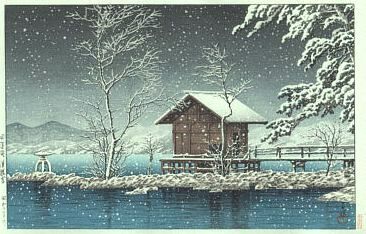
|
"A Small Shrine in Snow, Tazawa Lake," 1927.
Watanabe H44
|
|
Narazaki #134
|
|
|
|
|
|
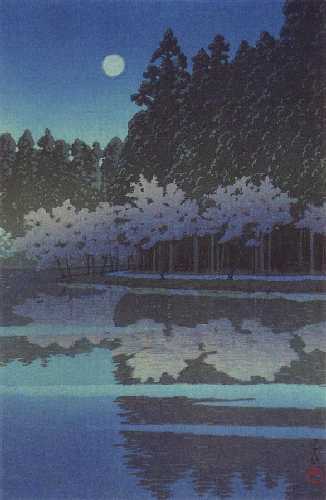
|
"Spring Night at Inokashira," 1930.
Watanabe H45
At Inokashira, located in the western outskirts of Tokyo, is a small
lake, surrounded by cherry trees, where the people gather end of
March to celebrate the cherry blossom, " Sakura", also
known as "O-hana-mi",
literally "let's see the flowers," but actually an excuse
for (heavy) drinking and eating outdoors together with company people,
friends and family.
Within the lake is a small island - not seen here - with its "Inokashira Benten
Shrine," a popular subject depicted by several shin-hanga artists.
|
|
Narazaki #324
|
|
|
|
|
|
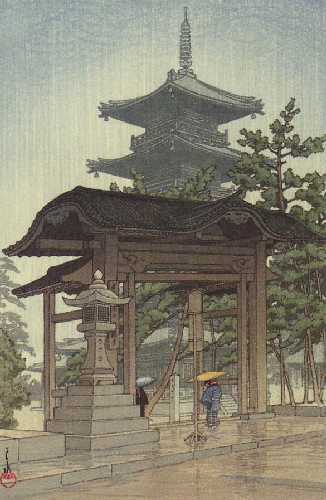
|
"Zentsuji Temple in Rain," 1937.
Watanabe H46
|
|
Narazaki #240
|
|
|
|
|
|
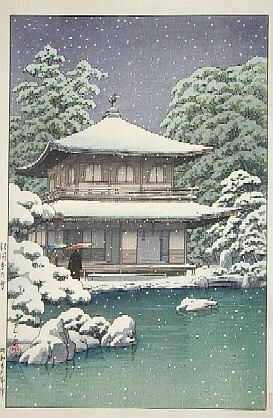
|
"Ginkakuji in Snow," 1951.
Watanabe H47
Ginkakuji, the "Silver Pavilion" in Kyoto, should not
be confused with the almost identical name Kinkaguji, the "Golden
Pavilion", which is yet another major tourist attraction in Kyoto.
|
|
Narazaki #532
|
|
|
|
|
|
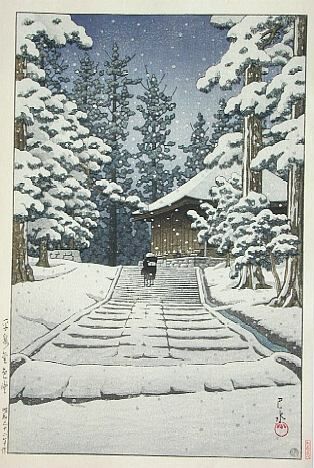
|
"Konjikido in Snow, Hiraizumi," 1957.
Watanabe H48
This print was the last print ever to be designed by Kawase Hasui. Sadly, he passed away
1957 just before this print was to be published. Thus, his "fate" did not allow him
to see the production of this, his final work: ....Stepping up a long stair towards heaven, we must now wonder, did
he already feel his end coming?? And, one must further wonder......could the "lone figure" seen in the distance perhaps even be Hasui himself??
Forty-nine days after the death of Hasui a ceremony - a special
day according to the Buddhist religion - was held. On this occasion, a
copy of THIS print was handed over to each of the mourners.
Could there possibly be a more fitting image to mark the end of this legend of a man among Japanese woodblock print designers?
|
|
Narazaki #567
|
|
The Seals
|

|
All five of these "new" prints bear the red, rectangular "Heisei" seal and in
addition to a black, round 7mm Watanabe seal. The "Heisei"
seal is printed onto the right lower margin, with the circular seal being printed within the
printed image area, sometimes easily visible in one of the lower corners,
sometimes almost hidden within in the image. For more information about
the seals of the Watanabe Publishing House, click here.
|
"Ginkakuji" - A Direct Comparison - "old" versus "new"
(To be added shortly.)
© Dr. Andreas Grund and Thomas Crossland 2002





